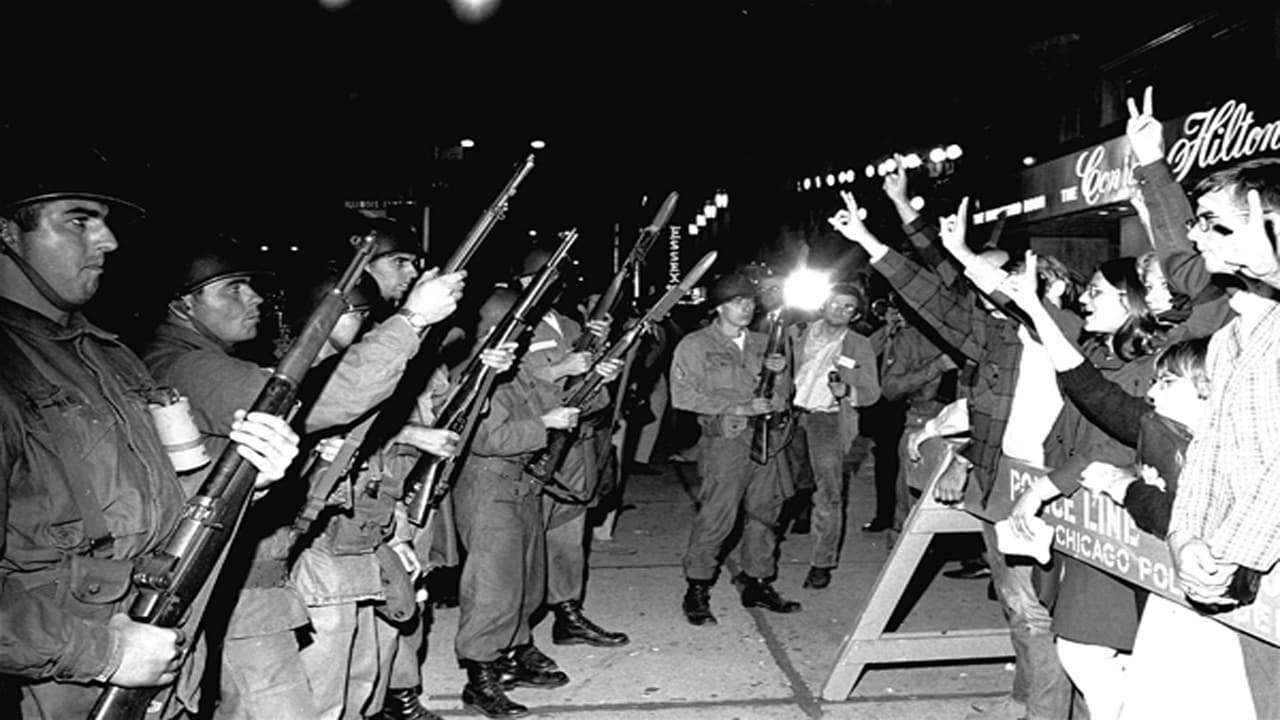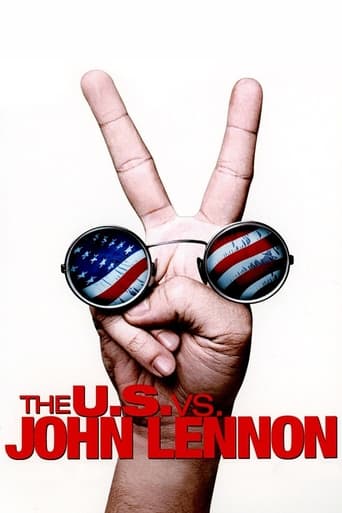

What a waste of my time!!!
... View MoreVery interesting film. Was caught on the premise when seeing the trailer but unsure as to what the outcome would be for the showing. As it turns out, it was a very good film.
... View MoreThe performances transcend the film's tropes, grounding it in characters that feel more complete than this subgenre often produces.
... View MoreIt really made me laugh, but for some moments I was tearing up because I could relate so much.
... View MoreWhen "The U.S. vs. John Lennon" came out, it was no doubt an allusion to everything that had gone on under George W. Bush. In fact, recently deceased interviewee Gore Vidal says "Lennon represented life, while Nixon - and Bush - represent death." The combination of the Civil Rights Movement and the Vietnam War led to unprecedented protests, and the US government responded mercilessly, with J. Edgar Hoover's FBI acting as more of a paramilitary force.The point that the documentary makes is that Lennon used his fame to fight for social justice like no one else had, and the Nixon administration - spurred on by the infamous Strom Thurmond - spared no effort in persecuting him for it. Everyone should see this documentary partially to understand what Lennon was all about, but also to understand what the US government is really up to when it talks about keeping "undesirables" out of the country. In the end, Yoko Ono notes that despite Lennon's murder, his message never died.Just so as not to be totally one-sided, the documentary interviews G. Gordon Liddy to get the government's side of the story. Liddy is just as creepy as ever. Other interviewees include Stew Albert (whom I knew personally), Tariq Ali, Carl Bernstein, Walter Cronkite, Ron Kovic, Bobby Seale, John Sinclair and Leon Wildes.
... View MoreJohn Lennon, singer, songwriter, and controversial member of the Beatles, began to see the world differently in 1966 with the advent of those horrendous early years of the Vietnam war. Upon meeting (and eventually marrying) avant-garde Japanese artist Yoko Ono, Lennon grew out his hair and beard and began staging intimate peace rallies accentuated by new songs of hope. But his show-bizzy activism didn't become a thorn in U.S. President Richard Nixon's side until a 1971 musical protest rally to free incarcerated marijuana smoker John Sinclair resulted in Sinclair's sudden release (just hours after a review board had denied the request). Lennon's ability to rally the young people of America--and his not-shy vocal stance against the war (and, by proxy, Nixon himself)--struck fear into the White House, particularly with Nixon about to campaign for his second term. The rock star was put under not-so-subtle surveillance by J. Edgar Hoover and the F.B.I., with men in suits on Lennon's tail, his phones tapped, plus a years-old British conviction for drug possession exaggerated for use in hopefully getting John and Yoko out of the country forever. Chronicling a nearly-forgotten chapter in music and political history, this fast-moving, clip-heavy documentary financed by Lionsgate, VH1, and Paramount is wonderfully entertaining, darkly amusing, moving, and yet finally depressing. With help from a savvy Immigration lawyer, John and Yoko were eventually allowed permanent residence in the States--a celebratory event which, in turn, lead to Lennon's assassination in 1980. The intricacies of fate, justice and injustice, good fortune and bad breaks are revealed here to a devastating effect. *** from ****
... View MoreFor how revolutionary the subject matter is, there's little revolutionary about this bland doc (except maybe the cool graphics). Revelations about Nixon and Hoover's attempt to deport Lennon are very interesting and are heightened by his lawyer's appealing interviews, but that takes up only about a half hour of the film. The first 45 minutes is setting up ground work: who John was and what was going on at the time. While this would probably be appealing for a teenager, for those of us who lived through the era it's pretty simple stuff. Once everything is wrapped up pretty nicely the last 20 minutes are spent on his death, without fully describing the details of it. The teenagers who were educated by the first forty minutes are then left feeling that his death had some connection to the persecutions he received in his life I assume this is done to intensify their argument. When in reality, the tragedy of his death was exactly that it was for no reason at all. Just like in the 60s and 70s, Lennon is still being used as a puppet.
... View MoreJohn was always my favorite of the Beatles. His lyrics always attempted to make complex issues easier to understand. He was also a true artist and one of those rare individuals that never rested on the familiar, but strove to explore the human situation. That's why Yoko was the perfect partner for him. She was and still is an artist that traveled the same wavelength as John. They were true soul mates and this film helps to reinforce that truth to the world.Today, we are faced with a political machine that perverts the media to twist the truth in such a way that it is indistinguishable from fiction (for more on this subject read Al Gore's latest book; The Assault on Reason). This movie does a very good job at showing the heavy handed genesis of how a dissenting opinion is viewed today.In today's American climate, the actions of John Lennon would have been discredited and actively smeared. That's not to say that the 'establishment' of the time didn't attempt to discredit and smear John's actions, but things have changed in today's climate. Basically, I see the biggest difference between the '70s and today is this; In the 70s, a peaceful message was hard to counter. Today, a peaceful message is vilified as being simplistic or unpatriotic or forwarding a 'liberal agenda'. In fact, this movie goes a long way to the unmasking of the fact that peace, love, and non-violence are at the core of most religious and spiritual philosophies. The movie highlights a truth espoused by many great individuals; that non-violent protest it the higher road to truly effective change, because violence will always be responded to with more violence.The US vs John Lennon is a wonderful documentary that gives us a window to our past and highlights a period in the life of a truly good man. John Lennon had his flaws, as all humans do, but he was an intelligent artist who had the foresight to use his celebrity status for a noble cause. We need more John Lennons in this world. We have too many celebrities that squander the public eye in a never ending cycle of rehab and tabloid sensationalism. At least when the Ono-Lennons took off their clothes, it was to make an artistic statement.I miss you John. Thank you Yoko for keeping his memory alive.
... View More